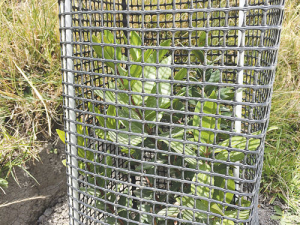Mountain Warrior's words of wisdom
The Mountain Warrior Shane Cameron is coming back to his roots as key note speaker at the East Coast Farming Expo Property Brokers Evening Muster in February.
 Planting trees is not all about pines, but the right tree for the right place for the right reason – such as pohutukawa.
Planting trees is not all about pines, but the right tree for the right place for the right reason – such as pohutukawa.
Hill country farmers’ efforts to prevent soil loss through erosion are being increasingly scrutinised.
This comes from environmental regulators and people wanting cleaner rivers and coastlines, says Northern Hawke’s Bay catchment manager Nathan Heath.
“And there is likely to be increasing regulatory pressure put on landholders who are not doing anything about erosion on their properties,” he says. “But there is money available for landholders to do soil conservation works on their properties.”
This topic will feature at the East Coast Farming Expo at the Wairoa A&P Society showgrounds on March 6 and 7.
Hawke’s Bay Regional Council (HBRC) spokesman Peter Manson says it has a new funding scheme aimed at helping hill country landowners to plant more trees for soil conservation.
“A grant rate of up to 75% is available this year from the Erosion Control Scheme (ECS) for activities that will help to keep productive soil on the hills and out of waterways,” he said.
“Depending on the situation and type of country, funding may be available for tree planting, fencing, associated weed and pest control and in some cases earthworks and structures.”
Manson says this is the highest grant rate made to hill country land owners in 30 years and demand is strong.
“It is likely the grant rate will lessen in the next year or two so the funds can be spread over more properties, so now is the time to get in.”
He says improving water quality in Hawke’s Bay is a key driver of the fund. But keeping organic matter on the hills is also important for pasture production and to store nutrients and soil moisture.
“While excess nutrients such as nitrogen and phosphorus are important on the easier country and flats, sediment is a more important contaminant of rivers flowing out of East Coast hill country. That same sediment often represents loss of productive potential,” Manson says.
“Some ECS work will include fencing and planting around waterways and native bush areas, which will add biodiversity benefits such as protection and creation of indigenous habitats.
“There are some criteria to be met including an assessment of the erosion risk, completion of a simple erosion control plan and finally getting the application approved for funding. Wairoa staff at the HBRC office can help with all of these.”
Another incentive designed, in part, to tackle erosion is the One Billion Trees programme; and it’s not just focused on pine trees, Heath says.
“It’s about the right tree in the right place for the right reasons.
“The challenge for farmers is to identify what is the right tree for them and their farming systems,” he says.
The expo is also an ideal venue for launching new products or releasing new research and technology straight to the target audience. Farmers and landowners can explore new ideas and have their questions answered by experts on the ground.
“If you are a Hawke’s Bay or East Coast farmer wanting to keep your business moving, or an agricultural innovator wanting to spread your message, this event is perfect,” says event director Dave Martin.
Details of the popular evening Muster will be announced soon; the event enables expo attendees and exhibitors to socialise with presenters and keynote speakers.
For more information on the expo or to buy tickets go to: www.eastcoastexpo.co.nz
The Meat Industry Association of New Zealand (MIA) today announced that Chief Executive Officer Sirma Karapeeva has resigned from the role.
The winners of the 2026 Hawke’s Bay/Wairarapa Dairy Industry Awards were announced at the annual awards dinner held at Copthorne Solway Park in Masterton on Thursday evening.
Environment Southland is welcoming this week’s decision by the Environmental Protection Authority (EPA) to approve the release of Blaptea elguetai, a leaf‑feeding beetle that will help control the highly invasive Chilean flame creeper.
This March, the potato industry is proudly celebrating International Women’s Day on 8 March alongside the International Year of the Woman Farmer, recognising the vital role women play across every part of the sector — from paddocks and packhouses to research, leadership, and innovation.
Fruit trader Seeka posted a record profit and returns to shareholders in 2025.
Recent weather events in the Bay of Plenty, Gisborne/Tairawhiti, and Canterbury have been declared a medium-scale adverse event.